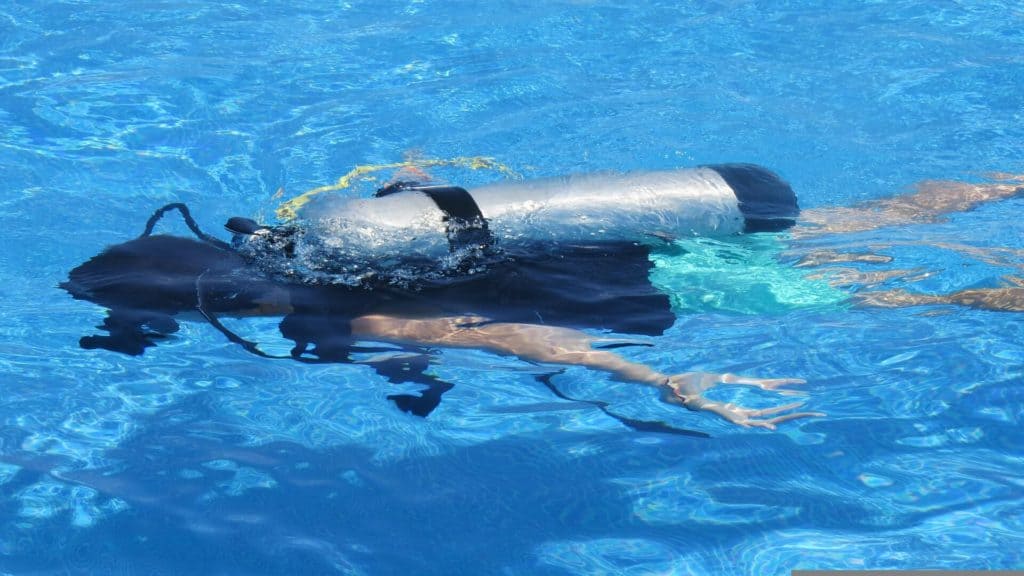Disclaimer: This page may contain affiliate links and I may get a small commission if you decide to make a purchase through my links, at no additional cost to you. Thank you!
So you want to pick up scuba diving.
And the curious you could not help but thinking of this: “Do you need to know swimming for scuba diving?”.
Well, that is one legit question.
Maybe you are worried that being a non-swimmer prevents you from exploring the amazing underwater world through scuba diving.
Or maybe you are thinking that you need the swimming skills of an Olympian to get into this outdoor water sport.
Guess no more; continue reading this quick guide on whether can non-swimmers do scuba diving and answer your question once and for all.
Let’s get into it!
The Big Question: Can You Scuba Dive Without Knowing How To Swim?
The direct answer to this question is yes. But there is more to it.
You can still scuba dive if you are not a swimmer. To get a taste of scuba diving, you can opt for PADI Discover Scuba Diving introductory course.
But if you are keen to be a certified scuba diver, knowing how to swim is a must-have skill.
That’s because your swimming skill will be tested in the PADI Open Water Dive Certification.
PADI Discover Scuba Diving
PADI Discover Scuba Diving is recommended for those who want to try this outdoor sport without committing too much effort, time, and resources.
In this 1-day introductory course, you will learn the basics of diving skills and the safety guidelines under a certified instructor.
You will also learn how to use the typical scuba diving equipment and underwater hand signals in this course.
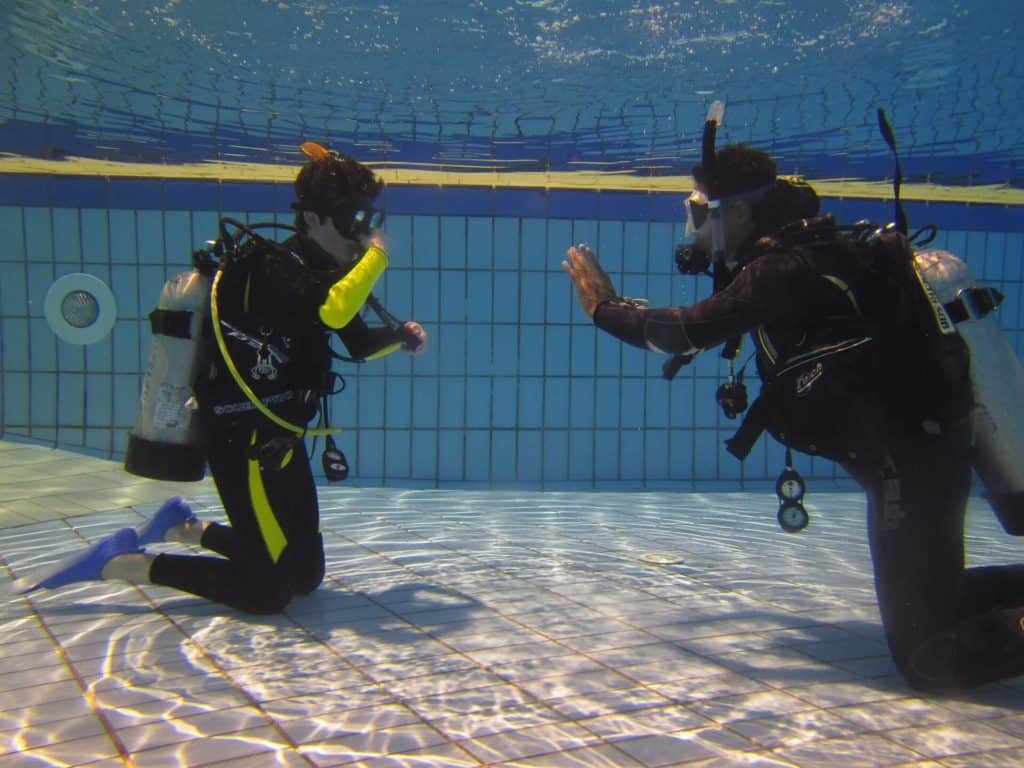
Depending on the dive center, Discover Scuba Diving is conducted in a pool, beach, or sea.
Tip: So make sure to survey and choose the center according to your water comfort level. If you are not confident breathing underwater and diving in the sea, then opt for a center that conducts the course in a pool.
Prerequisite For PADI Discover Scuba Diving
Here is the prerequisite for PADI Discover Scuba Diving:
- 10 years old and older
- Medically fit (Consult with your doctor first)
PADI Open Water Dive Certification
If you want to scuba dive without any supervision, then PADI Open Water Diver Certification is the first certification that you should get.
This beginner diving course is divided into two parts; theory and practical (four dives!).
Under a trained diving instructor, you will learn more in-depth about scuba diving so that you are confident in being underwater and solving diving issues that might arise.
You will also acquire the skills of putting on and using scuba diving gear and control your buoyancy when diving in this beginner course.
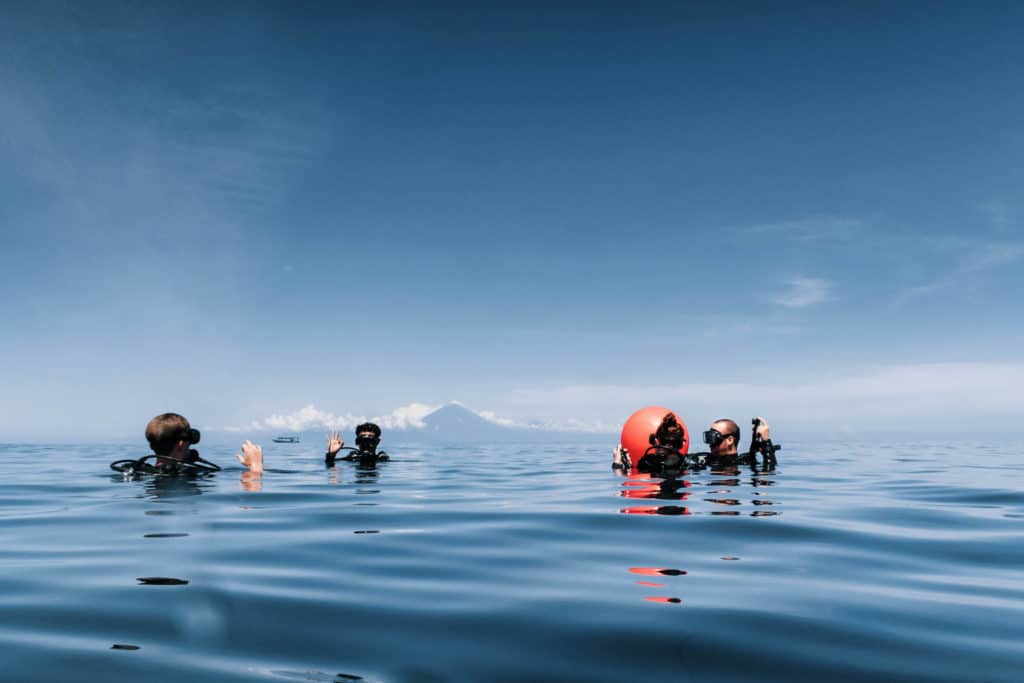
Your swimming skills will be tested in this course, where you need to:
- Tread or float in the water aid-free for 10 minutes
- Swim for 200 meters aid-free or 300 meters with aids (snorkel, mask, and fins are used)
Therefore, you need to know how to swim to be a certified diver.
PADI Open Water Dive Certification needs 4 to 7 days to complete.
Prerequisite for PADI Open Water Dive Certification
Here is the prerequisite for PADI Open Water Dive Certification:
- 10 years old and older
- Medically fit (Consult with your doctor first)
- Able to swim
Get yourself a wetsuit to insulate yourself when scuba diving in cold water or season.

Scuba Diving Swimming Requirements: PADI Discover Scuba Diving Vs Open Water Diver Certification
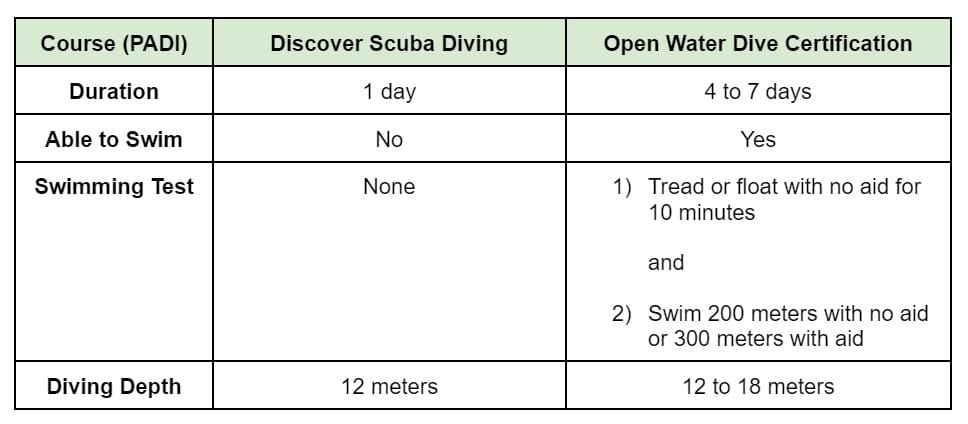
Is Swimming Needed For Scuba Diving?: 3 Top Reasons Why It Is Best To Learn It
1. Be Comfortable In Water
A typical scuba diving duration can last from 45 minutes to an hour. That means you will need to spend some time underwater.
With that, learning how to swim will make you feel comfortable gliding around confidently in a vast water body.
2. Prerequisite For Getting The Scuba Diving Certification
If you are being serious about getting Open Water Diving certification, knowing how to swim is one of the prerequisites.
To get the certification, you must be able to tread in the water for 10 minutes and swim for 200 meters without any aid.
3. A Life-Saving Skill
Swimming can be a life-saving skill especially when an unexpected mishap happens underwater.
You will be less likely to panic and can contribute to solving any difficulties in the water, posing a lesser risk to both yourself and your dive buddy.
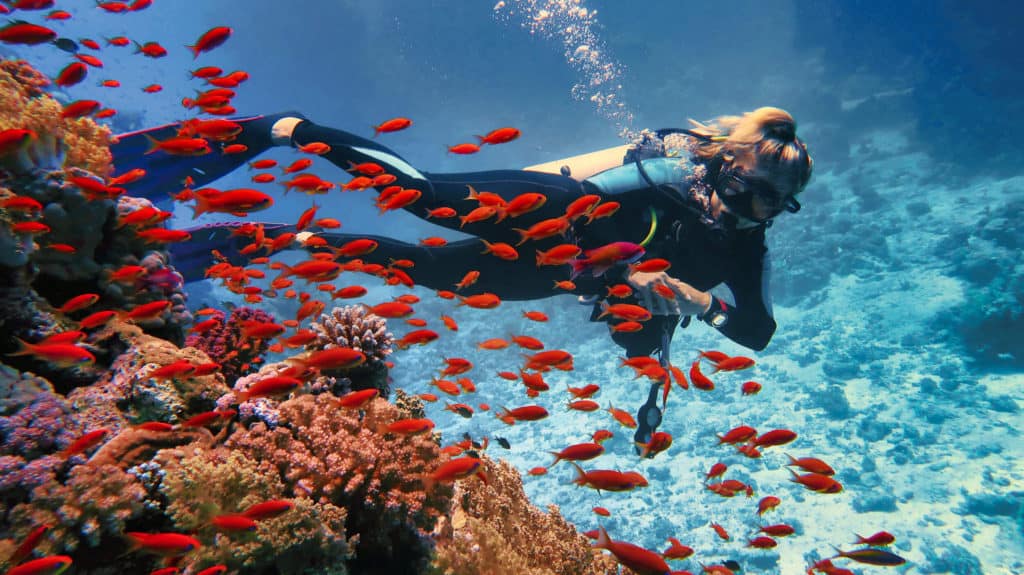
5 Helpful Tips To Boost Confidence Of Non-Swimmers When Scuba Diving
1. Overcome The Fear Of Breathing Underwater
Breathing underwater might seem illogical and scary at the same time, especially for non-swimmers.
But to scuba dive, one must learn how to breathe underwater.
If you have this fear, make your way to the local swimming pool and practice breathing underwater through a snorkel or a diving mask.

2. Have Enough Rest
Make sure to have enough rest and keep yourself hydrated the night before the diving day.
Ample rest can help you to stay alert and pay full attention to the dive instructor’s guide while underwater.
If you are keen to learn more, check out my detailed article on scuba diving tips for beginners.
3. Learn The Diving Hand Signals
To communicate with the dive buddy or instructor effectively underwater, it is recommended for you to learn the diving hand signals.
Some of the commonly used hand signals among divers include OK Signal, Problem Signal, Low On Air Signal, Out Of Air Signal, Ascend Signal, and others.
4. Stay Relax And Breathe Slowly
Staying relaxed and breathing slowly are one of the most important you can do as a non-swimmer while scuba diving.
When you start panicking, you will inhale at a faster pace. That means your oxygen tank will run out fast too.
This can lead to a potentially dangerous outcome when you are running out of air as you ascend to the surface.
5. Learn How To Swim
And the best thing to do to boost your confidence is to learn the basics of swimming!
You can enroll yourself in several swimming lessons and get comfortable moving around in the water before opting for a scuba dive.
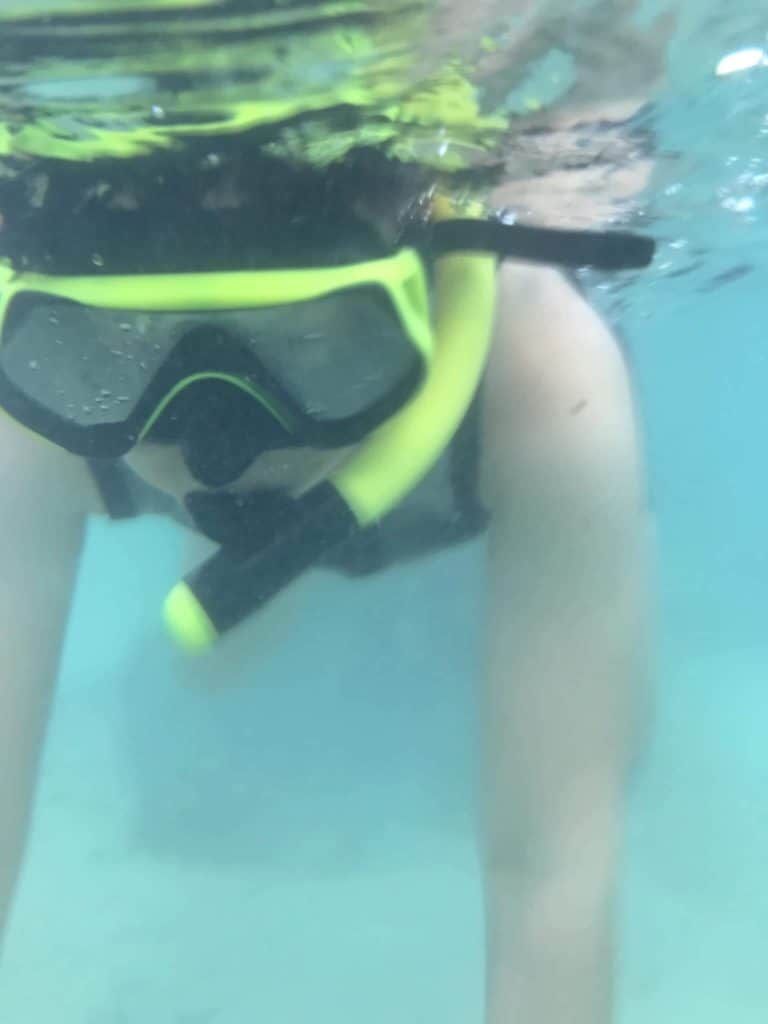
FAQs: Do You Need To Know How To Swim To Scuba Dive
1. Who can do scuba diving?
While there is no maximum age cap, the minimum age to learn scuba diving is 8 years old. People with physical disabilities are also eligible to learn scuba diving, upon seeking approval from their doctors. There is also no official size or bodyweight limit when it comes to scuba diving.
2. Who cannot do scuba diving?
It is best to be medically cleared by your doctor before getting into scuba diving. People with the following conditions are advised not to scuba dive:
- Have breathing issues, including asthma
- Have cold, congestion, or flu
- Have ear issues
- Had ear surgery within the past 12 months
3. Is scuba diving scary for non-swimmers?
Being in the water could feel foreign to some, especially to the non-swimmers. As you are not familiar with this aquatic environment, chances are you might feel uncomfortable and are not moving with ease.
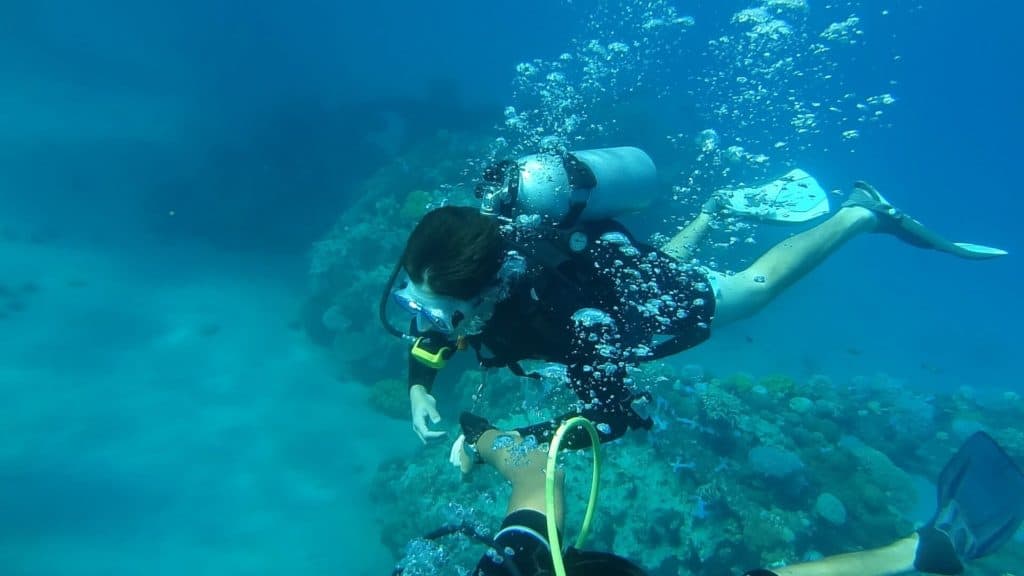
4. Is scuba diving dangerous?
There are some risks involved when you scuba dive. These include decompression sickness, nitrogen narcosis, air embolism, and others. But like any other physical sport, most likely you will turn out fine as you follow the diving rules and guidelines religiously.
5. Do I need to own my own scuba diving gear?
No. Most dive centers provide scuba gear to their students for a small fee when trying out for this sport. You may choose to get your own scuba diving gear later down the road if you are planning to do this underwater sport for a long time.
Bring your diving gear all at once conveniently using this scuba diving mesh backpack.

6. How much will my diving course cost?
Different dive centers might offer the same diving course at different pricing, depending on the class size, location, season, and others. So it is best to check with the individual dive centers for the diving course cost and its related information.
7. Scuba Diving Certification: 14 Distinct Levels In PADI
Here is the list of 14 levels of PADI scuba diving certification, ranging from recreational to professional level.
- PADI Scuba Diver
- Open Water Diver
- Adventure Diver
- Advanced Open Water Diver
- Rescue Divers
- Master Scuba Diver
- Divemaster
- Open Water Scuba Instructor
- Specialty Instructor
- Master Scuba Diver Trainer
- IDC Staff Instructor
- Master Instructor
- Course Director
- Master Scuba Dive
Do You Need To Know Swimming For Scuba Diving: Conclusion
So now you have gotten the answer to “Do you need to know swimming for scuba diving?”.
In short, you can scuba dive without knowing how to swim by signing up for the PADI Discover Scuba Diving course. You can explore the underwater world under the supervision of a certified instructor.
Alternatively, to be a certified scuba diver, you need to opt for Open Water Dive Certification.
Open Water Dive Certification comes with a swimming test, so you need to know swimming to get certified.
With this first scuba diving certificate, you can scuba dive to a maximum depth of 18 meters within local or international sites without the instructor’s supervision.
Regardless of which course you choose, you are bound to experience a whole new world where breathing underwater is the new norm.
Have fun diving!

Sam Lee, founder of Sam Lee Travel, is a seasoned traveler with over 10 years of experience exploring various Asian countries. Having lived in Singapore for almost a decade, Sam has developed a deep understanding of the culture, customs, and attractions in the region.
With a passion for outdoor travel adventures and water sports, Sam has helped over 25K readers per month plan their trips around Asia, including off-the-beaten-path destinations, offering helpful travel tips and unfiltered personal travel experience.
